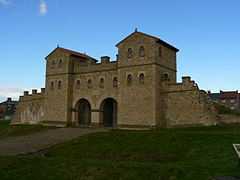Portgate
Coordinates: 55°00′46″N 2°01′18″W / 55.012663°N 2.021612°W
| Portgate | |
|---|---|
|
Although the structure of the Portgate is unknown, it is likely to have resembled this reconstruction gateway at Arbeia | |
 Portgate | |
| OS grid reference | NY98736869 |
| |
The Portgate was a fortified gateway, constructed as part of the Roman Hadrian's Wall (Dere Street preceded Hadrian's Wall by around 50 years). It was built to control traffic along Dere Street as it passed through Hadrian's Wall. Its remains exist beneath the old B6318 Military Road to the south-west of the Stagshaw Roundabout (the B6318 was diverted slightly for the construction of the Stagshaw Roundabout, leaving two short sections of the existing road unlinked - the remains of the Portgate are buried beneath the western section).[1]

Origins of the name
If any name was given to the structure by the Romans, it is no longer known. The name Portgate is thought to be of Anglo-Saxon origin.
Construction
The Portgate was constructed from very large masonry blocks. It projected between 3.06 metres (10.0 ft) and 3.66 metres (12.0 ft) north of the wall, sitting astride the wall. It was probably a square or rectangular structure.[2]
Excavations and investigations
- 1732 - John Horsley reported visible remains of a fortification at the location, stating[3]
| “ | There has been a square castellum, half within the wall and half without. There is a suggestion even today that the ditch of the wall turned northward round such a building. | ” |
- 1955 - English Heritage Field Investigation. It was noted that to the east of Dere Street there is a suggestion that the ditch turned north and followed the road for a short distance, however it is probable that this effect is due to contemporary drainage ditches.
- 1966 - Excavation directed by Miss D. Charlesworth exposed the west tower of the Portgate in the verge a few inches North of the kerb of the B6318.[4]
Monument Records
| Monument | Monument Number | English Heritage Archive Number |
| Portgate | 181662 | NY 96 NE 5 |
References
- ↑ "Portgate". Pastscape. English Heritage. Retrieved 26 Aug 2010.
- ↑ Breeze, David J (1934), Handbook to the Roman Wall (14th Revised edition - Nov 2006), Society of Antiquaries of Newcastle upon Tyne, p. 184, ISBN 0-901082-65-1
- ↑ Horsley, John (1732), Britannia Romana or the Roman Antiquities of Britain, Frank Graham (published 1974), ISBN 0-85983-090-X
- ↑ The Journal of Roman Studies (London: Society for Promotion of Roman Studies) 57: 177. 1967. Missing or empty
|title=(help)
Bibliography
- Daniels, Charles (1979), "Review: Fact and Theory on Hadrian's Wall", Britannia 10: 357–364, JSTOR 526069
| ||||||||||||||||||||

